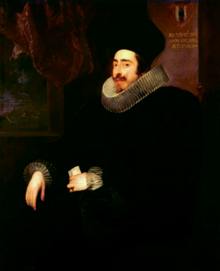Giovanni Vincenzo Imperiale (1582 – 21 June 1648) was an Italian nobleman, art collector, and man of letters.
Giovanni Vincenzo Imperiale | |
|---|---|
 Anthony van Dyck: Portrait of Giovanni Vincenzo Imperiale, 1626, oil on canvas, National Gallery of Art, Washington, D.C. | |
| Born | 1582 |
| Died | 21 June 1648 (aged 65–66) |
| Occupations |
|
| Spouses | Caterina Grimaldi
(m. 1604; died 1618)Brigida Spinola (m. 1621) |
| Children | 7 |
| Writing career | |
| Language | Italian language |
| Period | |
| Genres | Poetry |
| Literary movement | |
| Notable works | Lo stato rustico |
Biography edit
Giovanni Vincenzo Imperiale was born in 1582 at Sampierdarena (a suburb of Genoa).[1] He was the only son of eight siblings born to one of the five leading families of Genoa whose importance and wealth had been established in the 16th century. His father, Giovanni Giacomo Imperiale, was elected Doge in 1617.[1] His mother, Bianca Spinola, was the sister of Orazio Spinola, the future archbishop of Genoa.[1]
We have little information about his youth and cultural formation. By the age of 18 Giovanni Vincenzo was a member of the Accademia dei Mutoli and at 25 he published the poem Stato Rustico, which established his fame as a poet. He corresponded with other celebrated poets of his age such as Giambattista Marino. In his sprawling poem L'Adone, published in 1623, Marino makes specific reference to him: Giovanni Vincenzo appears in canto 18 as the shepherd Clizio (the protagonist of the Stato rustico) who warns Adonis of the dangers of hunting the boar and then laments his friend's death.[2]
In his early 20s, Giovanni Vincenzo was admitted to the prestigious Accademia degli Addormentati, whose members included Gabriello Chiabrera, Angelo Grillo and Ansaldo Cebà.[1] In November 1604, he married Caterina Grimaldi, a member of another prestigious Genoese family.[1] Marino celebrated the marriage in the epithalamium Urania.[1] Caterina died on 17 January 1618 while giving birth to the couple's second son.[1] After her death, Imperiale married Marchesa Brigida Spinola Doria (1583-1660).[1]
Imperiale held various public offices. His political and military career began in 1616, when, through the influence of his father, he was named ambassador to the Duke of Mantua.[1] In 1619 he was made admiral of the Genoese navy and in 1624 assumed the position of capitano della Polcevera, in both capacities helping defend the republic against the pillaging of pirates.[1] He was elected senator on 10 June 1626.[3] Giovanni Vincenzo maintained his central place in Genoese political and cultural affairs in succeeding years. He continued to serve the republic as an emissary for important political matters, particularly in Naples. Eventually, however, his growing power threatened other members of the Genoese nobility, and in June 1635 he was exiled.[1] He took refuge first in Parma, then in Modena and finally in Bologna.[1] He returned to Genoa in April 1638, where he lived until his death on June, 21 1648.
Works edit
Imperiale's literary works include the ‘argomenti’ of the 1604 Genoese edition of Torquato Tasso's Jerusalem Delivered.[4] His masterpiece is considered the didactic poem in blank verse Stato rustico (1607), which describes an imaginary journey from Genoa to Greece, where the semi-autobiographical poet-shepherd Clizio is welcomed on Mount Helicon by Apollo and the Muses.[5] The work caught the imagination of Giambattista Marino, who introduced the character of Clizio into the first canto of his epic poem L'Adone.[5]
Art collection edit
Giovanni Vincenzo Imperiale was an important patron of arts. His extensive art collection numbered 325 works at the time of his death in 1648.[6] His collection, including works by Giorgione, Correggio, Rubens, van Dyck, Palma il Giovane, Guido Reni and many others, was inherited by his son, Francesco Maria Imperiale, who tried to sell it to Charles II Gonzaga.[1] By the mid 18th century the collection was dispersed.[1] Today Giovanni Vincenzo's portrait by Anthony van Dyck is housed in the National Gallery of Art.[7]
Notes edit
- ^ a b c d e f g h i j k l m n Pignatti & Russo 2004.
- ^ Imperiale's identity with Clizio is established in the allegory to the first Canto. Adone, I, p. 55: "Sotto la persona di Clizio s'intende il Signor Giovan Vincenzo Imperiali, gentiluomo genovese di belle lettere, che questo nome si ha appropriato nelle sue poesie." The reference is to Imperiale's Lo stato rustico (Venice, 1613). On the role assigned to Clizio in Marino's Adone, see Danielle Boillet, 'Clizio et Fileno dans I'Adone de Marino', in Emilio Russo (ed.), Marino e il Barocco, pp. 259-87.
- ^ Martinoni 1983, pp. 65–67.
- ^ La Gierusalemme di Torquato Tasso con gli argomenti del sig. Gio. Vincenzo Imperiale figurata da Bernardo Castello, Genoa, Giuseppe Pavoni, 1604.
- ^ a b Diffley 2002.
- ^ Wheelock, Arthur K. (2005). Flemish Paintings of the Seventeenth Century. Washington DC: National Gallery of Art. p. 63. ISBN 978-0894683480.
- ^ "Giovanni Vincenzo Imperiale, 1626". www.nga.gov. 1626.
Bibliography edit
- «Gio. Vincenzo Imperiale Genovese». In : Le glorie de gli Incogniti: o vero, Gli huomini illustri dell'Accademia de' signori Incogniti di Venetia, In Venetia : appresso Francesco Valuasense stampator dell'Accademia, 1647, pp. 260–263 (on-line).
- López Bernasocchi, Augusta (1980). "Tradizione e innovazione in un poema del Seicento: lo Stato rustico di Gian Vincenzo Imperiale. Lettura della Parte V". Studi secenteschi. XXI: 41–107.
- Martinoni, Renato (1983). Gian Vincenzo Imperiale, politico letterato e collezionista genovese del Seicento. Padua: Antenore.
- Diffley, P. (2002). "Imperiale, Gian Vincenzo". In Peter Hainsworth; David Robey (eds.). The Oxford Companion to Italian Literature. Oxford University Press. ISBN 978-0-19-818332-7. Retrieved 17 June 2023.
- Pignatti, Franco; Russo, Emilio (2004). "IMPERIALE, Gian Vincenzo". Dizionario Biografico degli Italiani (in Italian). Vol. 62: Iacobiti–Labriola. Rome: Istituto dell'Enciclopedia Italiana. ISBN 978-8-81200032-6.
- Piantoni, Luca (2014). "Per lo Stato Rustico di Giovan Vincenzo Imperiale. Note stilistiche a un poema antinarrativo". Lettere Italiane. 66 (2): 247–276. JSTOR 26240843.